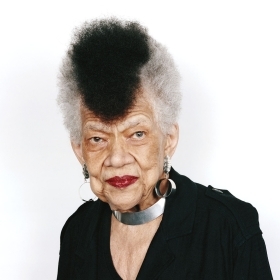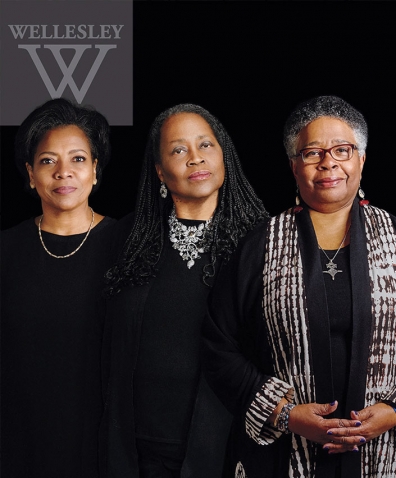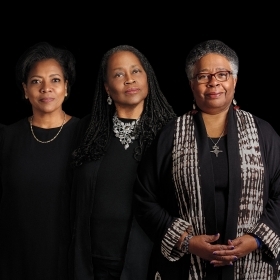The Ethos Cover and Story
It is a beautiful cover (“The Generations of Ethos,” spring ’18). The stories inside are absorbing. Thank you. Wellesley encouraging diversity on so many levels is a joy. It will help to change the world.
Anstiss Morrill ’59, Farmington Falls, Maine
Can’t love this enough!!!
Dorothy Jones-Davis ’98, Silver Spring, Md., Via Facebook
I am so proud to be a Wellesley woman, and Ethos ensured my experience was whole.
Liz Miranda ’02, Roxbury, Mass., Via Facebook
Love this! Read every word. Feeling proud and inspired and proud some more.
Tanyanika Samuels Davis ’96, Bronx, N.Y., Via Facebook
Love love love!!!
Azizah Yasin ’94, Springfield, Mass., Via Facebook
For the first time in the 41 years since I graduated from Wellesley, I read an edition of the Wellesley magazine with great interest. “The Generations of Ethos” article (spring ’18) both mirrored and diverged from my experiences at Wellesley from 1973 to 1977, and that is how it should be. The experiences of African-American women at Wellesley, and all women, are not monolithic.
There were missteps by College administrators in the “early years” to weave African-American women into Wellesley’s fabric. Whether it was to house African-American women together so they could more easily bond with each other or to scatter them across the campus to create a more visible sense of diversity, Wellesley nevertheless tried to forge a path forward. With the achievements in creating places and spaces that spoke to and supported the interests of African-American students, Wellesley became a college of first choice for women of color.
And yet, there remains a frontier that is still uncharted. As you open the first page of the magazine (for those reading the magazine in hard copy), there is a solicitation from the president of the Wellesley College Alumnae Association. I wondered, will reading this edition of the magazine motivate alumnae, especially alumnae of color, to contribute to Wellesley? Will reading these articles inspire alumnae who have previously contributed to donate again?
A few years ago, I made a contribution to Wellesley of an amount that was substantial (at least in my wallet), and I received a cursory and generic acknowledgment. For me, the reply was disappointing, and it missed an opportunity. I believe that another frontier for Wellesley is to further harness the power of alumnae of color and create development prospects who can impact Wellesley far into the future.
Doris Davis ’77, Hartsdale, N.Y.
A response from the Office for Resources:
We thank Doris Davis ’77 for her letter. We value every gift, regardless of size, so we were distressed to hear that her giving experience was disappointing, and we sincerely apologize. Her generosity makes a very real difference in the lives of Wellesley students, as do all alumnae gifts.
The 50th anniversary of Ethos—an important event in the history of the College—was also a fund-raising milestone for Wellesley and our students and alumnae of African descent. The founders of Ethos spearheaded a very successful campaign this year with gifts totaling more than $170,000, to be used to advance the purposes for which Ethos was founded. I very much hope that both the Ethos 50th-anniversary fund-raising effort and the magazine article do inspire alumnae to donate—whether again or for the first time—in support of our diverse and inclusive community.
Kimberly Hokanson, Interim Co-Vice President, Office for Resources
Thank you for highlighting Ethos in your current issue (“The Generations of Ethos,” spring ’18). When I returned to Wellesley for my 55th reunion last year, I was thrilled as we marched in the alumnae parade to see more and more women of color in succeeding classes—especially because their experience at Wellesley must have been sufficiently positive that they chose to come back. The work to make our country genuinely open and accepting of all is far from over, but I am proud that Wellesley is in the vanguard of that essential work.
Susan Stokes Ellis ’62, Westport, Conn.
Gorgeous portrait of strong female leadership.
Nichole Peterson ’94, San Diego, Calif., Via Facebook
50! Amazing.
Francine Carl Walker ’74, Dobbs Ferry, N.Y., Via Facebook
Beautiful cover!
Emily Rankin Welch ’99, Natick, Mass., Via Facebook
Stunning!
Aniella Gonzalez ’93, Miami, Via Facebook
Beautiful photograph.
Moriah Campbell-Holt Musto ’00, Milton, Mass., Via Facebook
Thank you for everything you’ve all done!! Beautiful interviews with some generations of past @Wellesley @WCEthos presidents <3
Hoi-Fei Mok ’10, San Leandro, Calif., @alifeofgreen Via Twitter
Ancient Mom
I read about Paula Butturini’s belated journey through motherhood with great interest, and found her descriptions charming (“Ancient Mom,” spring ’18). She writes with both feeling and humor. Her ending, referring to the movie Lady Bird, was perfect!
Kathleen Conklin ’73, Falls Church, Va.
More on Raising Feminist Boys
Regarding “How to Raise a Feminist Boy” in the winter ’18 issue: First and foremost, I admire the author’s efforts in carving a more cosmopol-itan path for her young son. As a stay-at-home parent to my three young sons (6 years old and younger), I consider myself to be striving to do much the same.
Putting all recommendations of appropriate screen time aside, my boys eagerly watch Disney, Nickelodeon, and popular animation movies just like the next kid. What I can’t help but notice, however, is the obvious lack of strong young (human) male characters in modern TV shows and movies targeted toward this younger set. Nowadays, unlike when many of us grew up, it’s the girls who have the coolest superpowers and are the center of attention. To this end, one doesn’t exactly have to strive too hard to raise a young feminist boy.
If I’m absolutely honest, I have run into the opposite problem, i.e. raising young boys who are happy in their maleness. My older two boys easily took notice of this “void of maleness” without my help, sometimes lamenting the fact that they are boys and asking me, “Why is it good to be a boy?” That is definitely not a question I ever imagined being asked, particularly by 2- and 4-year-old boys!
As popular as it is to support the female initiative, I have quickly become aware of how equally important it is to support my young boys in this current culture, reminding them of their uniqueness and value, not just as humans, but as males. I now find myself digging up those old cartoons and movies of my youth, so as to show my kids that boys can be cool, too! In all of this, most eye-opening for me has been this new need to explain the good or value in being a boy, which ultimately brings me to my hard point: In our attempt to transition from the oppressed, let’s remember to not become the oppressor.
Dawn Winkler ’02, Rockwall, Texas
Correction
The spring ’18 cover story, “The Generations of Ethos,” incorrectly identified the years Alyce Jones Lee ’81 was president of the organization. She and co-president Sheila Butler ’80 served in 1979–80. Lorraine Miller ’81 was Ethos president in the 1980–81 academic year. Wellesley regrets the error.








We ask that those who engage in Wellesley magazine's online community act with honesty, integrity, and respect. (Remember the honor code, alums?) We reserve the right to remove comments by impersonators or comments that are not civil and relevant to the subject at hand. By posting here, you are permitting Wellesley magazine to edit and republish your comment in all media. Please remember that all posts are public.